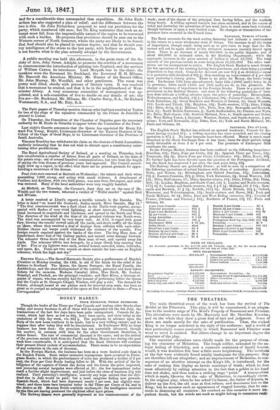The Paris papers of Thursday mention that an order had
been received at Toulon for two of the ships of the squadron commanded by the Prince de Joinville to proceed to Lisbon.
On Thursday, the Committee of the Chamber of Deputies gave the necessary authority for M. Emile de Girardin to appear before the Committee of the Peers.
Last night's Gazette announces that the Queen has appointed Sir Henry Ed- ward Fox Young, Knight, Lieutenant-Governor of the Eastern Districts of the Colony of the Cape of Good Hope, to be Lieutenant-Governor of the Province of South Australia.
Viscount Brackley has withdrawn his claim on the electors of South Lancashire; modestly intimating that he does not wish to obtrude upon a constituency enter- taining other predilections.
The Royal Agricultural Society of Ireland, at a meeting on Thursday, took into consideration a number of letters from all parts of Ireland, on the state of the potato crop: out of several hundred communications, but two went the length
of saying the true disease of previous years had appeared. The Council accord- ingly drew up a report to the effect that there are no present grounds for appre- hending a recurrence of the disease.
Food riots were renewed at Redruth on Wednesday; the miners and their wives assembling 7,000 strong, and acting with much violence. A detachment of Fusiliers and Artillery, with two field-pieces, was sent from Devonport, and order was restored. Many of the local authorities were very roughly handled.
At Mirfield, on Thursday, the Coroner's Jury that sat on the case of Mr. Wraith and the two women, returned a verdict of " Wilful murder " against Reid and M'Cabe.
A letter received at Lloyd's reports a terrific tornado in the Danube. The letter is dated "on board the Goshawk, Salina mouth, River Danube, May K." "The first commencement was a dark cloud in the North-west quarter, accom- panied with flashes of very vivid lightning, at short intervals. Presently the cloud increased in magnitude and blackness, and spread to the North and West. The direction of the wind at the time of its greatest violence was North-west. The wind was accompanied by very heavy rain. At 3.15, it raged with great fury, blowing the vessels' stowed sails off the yards, and drove nertrly all the ships on shore, where they received a deal of damage from collision with each other. Neither chains nor warps could withstand the violence of the squalls. Five foreign vessels capsized against the banks of the river. The brig Mary Ann, of Sunderland, drove foul of the Galway packet, and caused some damage forward. The schooner Orion drove foul of the Russ man of-war, and carried away his yards. The schooner Olivia lost bowsprit, by a large Greek brig running foul of her. Five or six lighters were sunk, several houses unroofed, boats, bulwarks, and spars, &c. There are two vessels on shore outside the bar—one an English schooner, which lies high and dry."


























 Previous page
Previous page